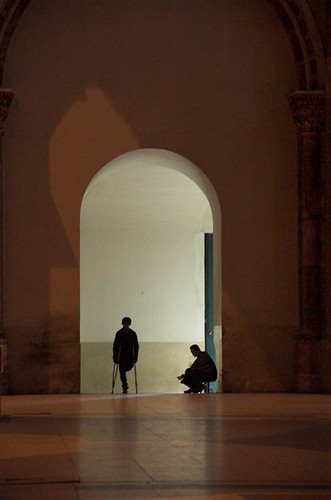
I have spent my adult life confronted by people asking me for money on the street. In college in Washington DC, as a young graduate in Cairo, a grad student in Boston, and in the various countries of Central Asia. I have a policy now on who I give to, and why I do it. It’s the combination of some great advice I received from a Georgetown professor* and my own knowledge of development and poverty.
Here’s the policy:
I don’t give money to children. I will give them food if I have it, but I don’t give money. Children should be in school, not out earning money on the street. I don’t want to encourage children to beg, or their parents to send them out to beg. In accounting terms, children should not be a profit center – especially not in this way – and I am not going to contribute to it.
I don’t give money and expect it to have any long-term impact. Five dollars or a banana isn’t going to change anybody’s life. It will buy their next meal, or their next beer. It will make this day a little better for them. That is all. When I give money, I give it with that understanding.
I have a budget. I spend ten dollars a week on giving money to people who ask for it. It doesn’t come out of my charitable contribution budget, because I use that for donations that will have an impact. It has its own line in my budget.
If you had to name that line in my budget, I guess you could call it humanity. I give because I don’t want to become someone who ignores the pain of others. We’re all human beings, together, on this planet, and it’s only an accident of luck that means I can give and not receive. I recognize that, and so I give. If I was hungry and alone on the street, I wouldn’t be worried about sustainability, I would be worried about dinner.
That’s it. That’s the policy.
Note #1 – The story my professor at Georgetown told our class: He was in a North African Country – Algeria, I think – and he was very uncomfortable with all the beggars on the street. He’d plan his walk to his university to avoid them. He didn’t look them in the eye. He never knew if he should give. Then, one night, he was walking with an Algerian colleague. His colleague stopped suddenly in the middle of their conversation, and crossed the street in order to give money to a beggar. My professor realized then he needed to find a way to be equally compassionate himself. He went home and told his wife about it, and she suggested a weekly budget for him, and that is what he has done ever since. And also what I do.
Note #2 – I have a friend who used to have a weekly budget for giving to the homeless, when he realized one day that $10 a week is $520 a year. Now, ever January, he writes a $600 check to an organization that works with the homeless and he never gives money on the street. That seems like a reasonable and pragmatic approach to me, but it doesn’t suit my own heart.
*******

